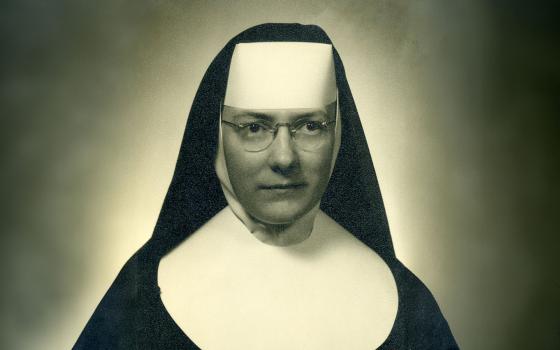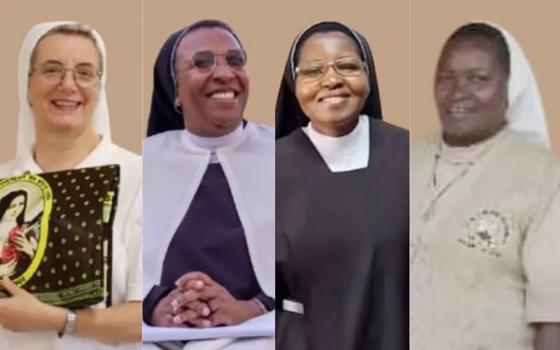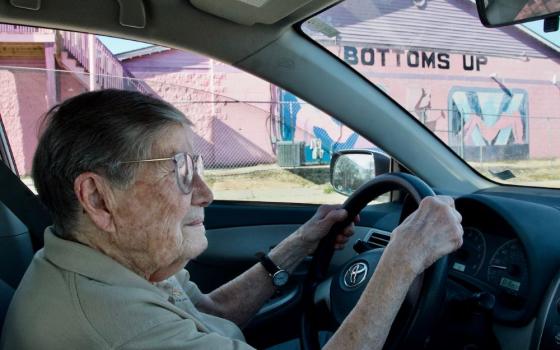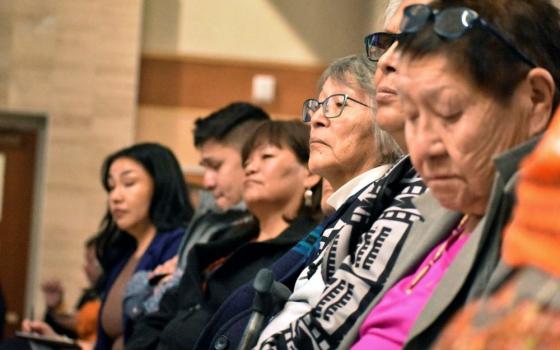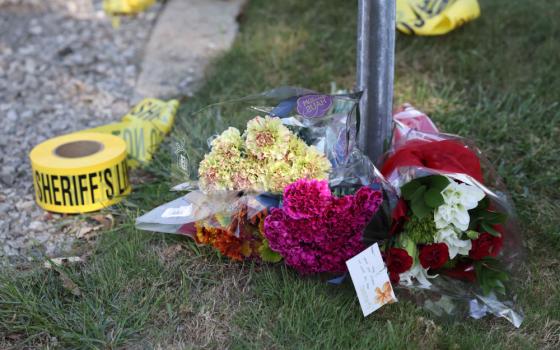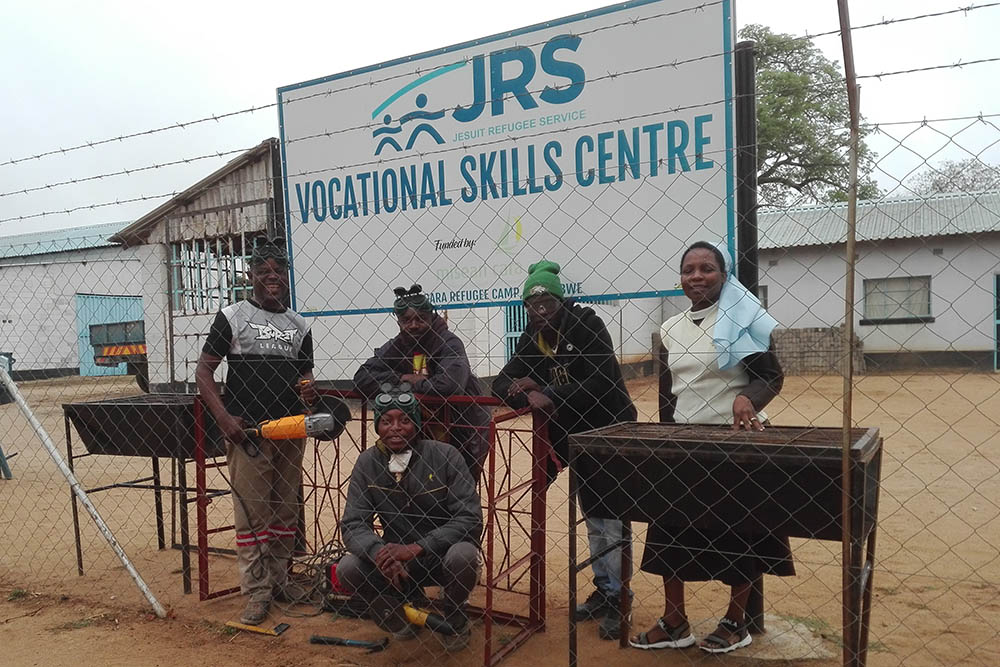
Sr. Mildness Chinake, right, visits welders. Vocational skills training is a key component of empowering refugees at the Tongogara Refugee Camp in Harare, Zimbabwe. (Courtesy of Mildness Chinake)
Despite grabbing global attention for years for its political, economic and human rights crises, Zimbabwe is hosting thousands of refugees from across Africa who are fleeing civil strife in their homelands. At the Tongogara Refugee Camp in the capital city of Harare, Sr. Mildness Chinake, a member of the Handmaids of Our Lady of Mount Carmel (Carmelites), is a project director with the Jesuit Refugee Service. JRS provides pastoral care to meet the spiritual needs of refugees.
She joined the Carmelite sisters in 2002. Before her ministry at the refugee camp, she worked as a school counsellor at Kriste Mambo (Christ the King) in Rusape, and at the St. Marcelin Orphanage in Harare.
GSR: How many refugees are working with JRS at the Tongogara Refugee Camp? What would you say are their most urgent needs? What skills are they being equipped with?
Chinake: The September 2021 UNHCR statistics indicate that Tongogara Refugee Camp hosts a total of 15,210 asylum-seekers and refugees, 7,120 females and 8,090 males. Jesuit Refugee Service is working with 7,000 persons of concern [refugees], asylum-seekers and [the] host community. The urgent needs of the [refugees] are drawn from the objectives of the Global Compact on Refugees, and the government of Zimbabwe commits to enhance self-reliance for refugees, asylum-seekers and host communities; to promote and increase access to tertiary education for refugees, asylum-seekers and host communities by establishing [a] vocational training center with an innovation hub and blended learning program and to facilitate inclusion of refugees and asylum-seekers in sport and cultural programs.
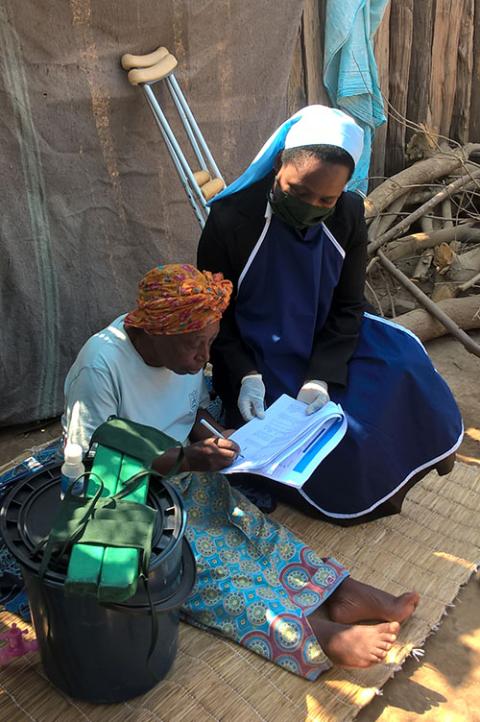
Carmelite Sr. Mildness Chinake visits with an elderly woman at the Tongogara Refugee Camp in Zimbabwe. Her ministry with Jesuit Refugee Service includes offering psychosocial support. (Courtesy of Mildness Chinake)
The [refugees] are being equipped with vocational skills training, education and commercial farming with different partners operating at Tongogara Refugee Camp. The [refugees] at Tongogara Refugee Camp engage in some income-generating activities, but the majority depends on food assistance from the World Food Program and the various service providers in the camp.
JRS offers psychosocial support, education, pastoral work, vocational skills training and issues of child protection, while the [nongovernmental organization] Childline mainly works for child protection of those below the age of 18.
We also have the Zimbabwe Republic Police taking care of security and Zimbabwe Council of Churches [focusing mainly on] sporting activities, water and sanitization.
It should be noted that although different organizations are providing services, not all [refugees] have access to these services because of limited resources. That is why some implementing partners offer similar programs so as to cover more of the target population. The camp administrator has engaged the Zimbabwe Olympic Committee to include [refugees] in sporting activities.
How has COVID-19 affected work at the refugee camp?
COVID-19 has been a major drawback in the gains toward improving access to education in the camp. The prolonged school closures have seen some children and youths getting married, adopting negative coping strategies such as transactional sex, getting engaged in child labor and, ultimately, dropping out of school. Most of the activities were downgraded or suspended depending on the line of operation.
Are refugees still arriving in Zimbabwe during COVID-19 or would you say the numbers have eased?
The influx of new arrivals is recorded monthly. For this reporting period, there have been few new arrivals because of the COVID-19 pandemic. The COVID-19-induced lockdown has so much reduced movement and this has also [been] both a blessing and curse to both parties.
Advertisement
As a Catholic sister, how did you get involved with this work of the refugees? How long have you worked with JRS?
The Carmelite sisters served the [refugees] at Tongogara Refugee Camp [since] 2002. I joined JRS in January 2020. When I was doing my master's program at the University of Zimbabwe, my supervisor asked me to look into the works of the Cappadocian Fathers and how they dealt with social problems of their time and how best I could draw lessons for the Zimbabwean context. In the book written by Susan Holman, The Hungry Are Dying, the way [the Cappadocian Fathers — Basil of Caesarea, Gregory of Nazianzus and Gregory of Nyssa] explore their poverty sermons drives me to dedicate my serving to the disadvantaged.
[Gregory of Nyssa] says: Don't retain everything for yourself but share with the poor, who is God's favorite. ... If we want to be received by them in the eternal places, let us receive them now ... don't let another rob you of the treasure you are depositing ... embrace the wretched as gold ... the gift will not result in loss. So, your benefactions and your house will be filled with a plentiful harvest."
I was also motivated by the online orientation course that I did when I joined JRS.
The founding letter of Pedro Arrupe [superior general of the Jesuits] said, "With request that you pray for all Jesuits that they may work with the poor and oppressed with greater love and dedication. And pray for me that I may help them to do this in some small way." His words feed into my commitment of serving the disadvantaged.
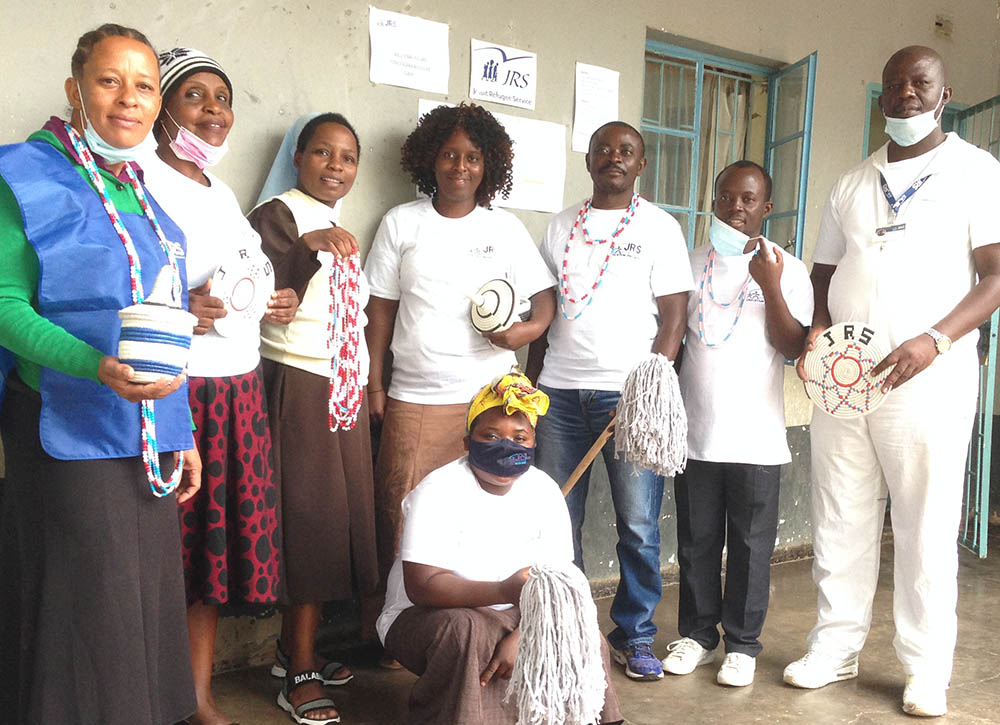
Carmelite Sr. Mildness Chinake, third from left, joins other Jesuit Refugee Service staff in displaying items made by elderly people at the Tongogara Refugee Camp in Zimbabwe. (Courtesy of Mildness Chinake)
What kind of challenges have you met as a religious working with refugees and how have you navigated these challenges?
There is a yawning gap in the provision of scholarships for tertiary education. Although a few learners have received some scholarships, there are still quite a sizeable number of advanced-level learners who need to proceed to tertiary education. It is very stressful to have sessions with students who passed their A-level very well and you do not have funding for tertiary education.
My prayer is to see all students who passed their A-level exams proceeding to tertiary education. The local secondary school needs to be upgraded to advanced-level status, so that it may become a one-stop shop for secondary education in the camp. National teacher strikes have affected access to education for the [refugee] and asylum-seeker children in the camp.
Accompanying people in very difficult situations sometimes is emotionally draining. In order to alleviate this, JRS allows staff members to take time away from their working environment [so that they may] return to work refreshed and ready to continue their mission.
What would you advise other younger sisters who would like to work with refugees?
They should be able to work with people of different religions, hence religious background is very important. There is a need to know certain things that are sensitive for other religions because you end up fighting for minor things.
They need to know that they will be working with people from war zones. They will be accompanying desperate, wounded, traumatized and angry people. As a result, there is a need to come up with coping strategies.
There is also a need to make sure that [refugees] are empowered into a healing and reconciliation process. They have to offer service to all [refugees] despite their denomination. When you are working with the [refugees], it is always good to forgive, because as you journey with them, you can be disappointed along the way. It is always good to be at peace with yourself, God and others. Positive attitude is vital.


